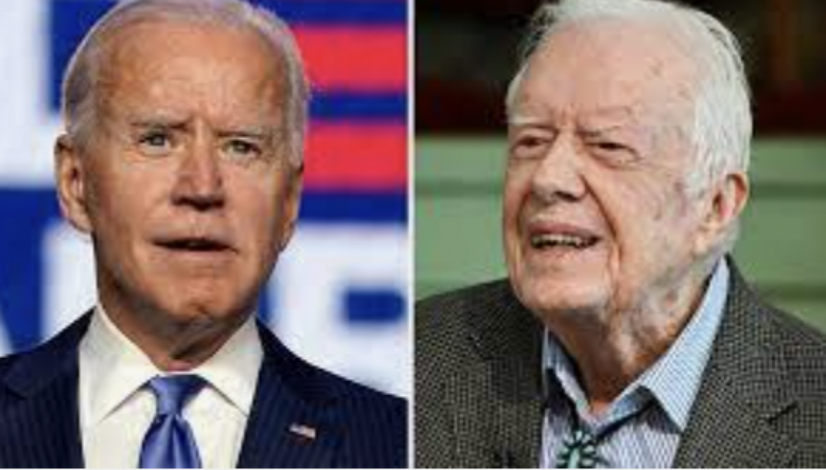Five lessons for Joe Biden from Jimmy Carter’s one-term presidency

On the evening of July 15, 1979, Jimmy Carter gave his infamous “malaise” speech, in which he blamed Americans discouraged by soaring inflation and an energy crisis for losing confidence in our country.
Days ago, Joe Biden gave his own malaise speech. Sitting down with an AP reporter for a rare interview, the president described the American people as “really, really down,” and repeated: “They’re really down. Their need for mental health in America has skyrocketed because people have seen everything upset.”
Like Carter, the president insisted that he wanted Americans to “be confident. Because I am confident.”
There are many parallels between Joe Biden’s first year and a half in office and Carter’s presidency: soaring inflation, a looming recession, international crises and an energy shortage, for starters.
With the benefit of hindsight, there are also five lessons Joe Biden should learn from Carter.
Lesson one is the critical importance of energy independence. After the 1979 revolution in Iran, a sudden dip in global production tightened markets, just like we’re seeing today from the war in Ukraine, which has cut Russian oil exports. OPEC raised prices 9% in 1979, which quickly led it higher gasoline prices for Americans and unhappy voters.
The vulnerability of the U.S. to global supply shocks then – and today — stemmed partly from declining domestic production.
As Carter explained, “In little more than two decades we’ve gone from a position of energy independence to one in which almost half the oil we use comes from foreign countries, at prices that are going through the roof. Our excessive dependence on OPEC has already taken a tremendous toll…”
Two years ago, under President Trump, we were energy independent for the first time since 1957; the pandemic and Biden’s war on fossil fuels have caused U.S. production to slump, adding to upward price pressures on oil.
The second lesson is the danger of price controls. Richard Nixon had imposed widespread wage-price controls beginning in August 1971. The price of domestically-produced crude oil was set by the federal government below the price charged on imports; when Carter lifted price controls in April 1979, oil companies were being paid $9.65 a barrel on average, while imports were priced at is more than $16.
The result of this cock-eyed program was sinking U.S. production.
In December 1970, the year before controls were imposed, the U.S. produced 10 million barrels per day of oil, a level not reached again until 2017, when higher prices and new technology boosted output.
Biden, whose approval ratings on managing the economy are in the tank, is doubtless tempted to impose new controls on oil prices. That would be a mistake.
The third lesson is that a windfall profits tax, such as that being encouraged today by Sens. Elizabeth Warren, D-Mass. and Ron Wyden, D-Ore., do more harm than good.
When Carter ended price controls on oil, he worried that Americans would resent the inevitable rise in prices at the pump. To offset any political hit he might suffer, he urged Congress to pass a windfall profits tax.
Congress did so and Carter signed a windfall profits tax in 1980, which was eventually repealed in 1988. As the Congressional Research Service reported, the tax was lifted because it resulted in declining U.S. oil production, disappointing receipts and a greater dependence on imports.
Lesson number four is that presidents are expected to take responsibility for problems that arise during their time in office, and to be honest with voters. Carter’s “malaise” speech, which does not, by the way, include the word “malaise,” was honest, and from the heart. Carter admitted that “I’ve worked hard to put my campaign promises into law, and I have to admit, with just mixed success.”
But he also discussed a “crisis of confidence” in the country, saying that it “strikes at the very heart and soul and spirit of our national will. We can see this crisis in the growing doubt about the meaning of our own lives and in the loss of a unity of purpose for our Nation.”
In words that resonate today, Carter described “a growing disrespect for government and for churches and for schools, the news media, and other institutions. This is not a message of happiness or reassurance, but it is the truth and it is a warning.”
And he criticized the American people, saying “In a nation that was proud of hard work, strong families, close-knit communities, and our faith in God, too many of us now tend to worship self-indulgence and consumption.”
That speech won Carter an 11-point pop in his approval ratings, but the gains were short-lived, which brings us to Lesson Five.
Two days after Carter’s famous speech, he fired nearly his entire cabinet, which unnerved voters and reinforced the idea that the White House was adrift. The lesson is: voters expect a steady hand at the helm. Joe Biden does not have a steady hand; he appears weak, erratic and dishonest.
Ronald Reagan blasted Carter’s pessimistic assessment of America and easily ousted the Democrat president.
Prior to his election, Reagan said, “I find no national malaise, I find nothing wrong with the American people. Oh, they are frustrated, even angry at what has been done to this blessed land. But more than anything, they are sturdy and robust, as they have always been.”
The American people preferred Reagan’s confidence and optimism and made Carter a one-term president. There’s a lesson there.
https://www.foxnews.com/opinion/five-lessons-joe-biden-jimmy-carter-one-term-presidency
Published on Fox News




